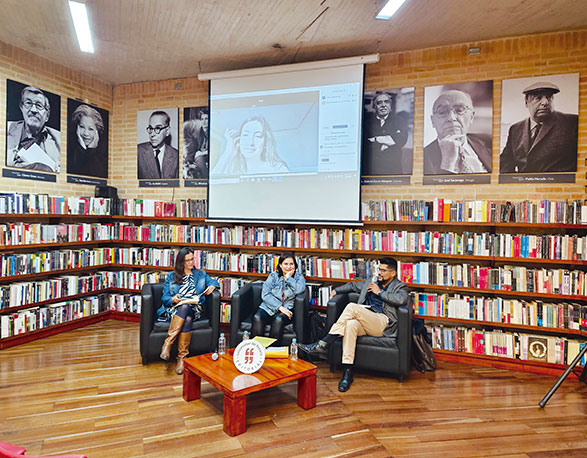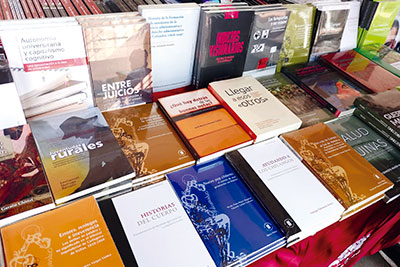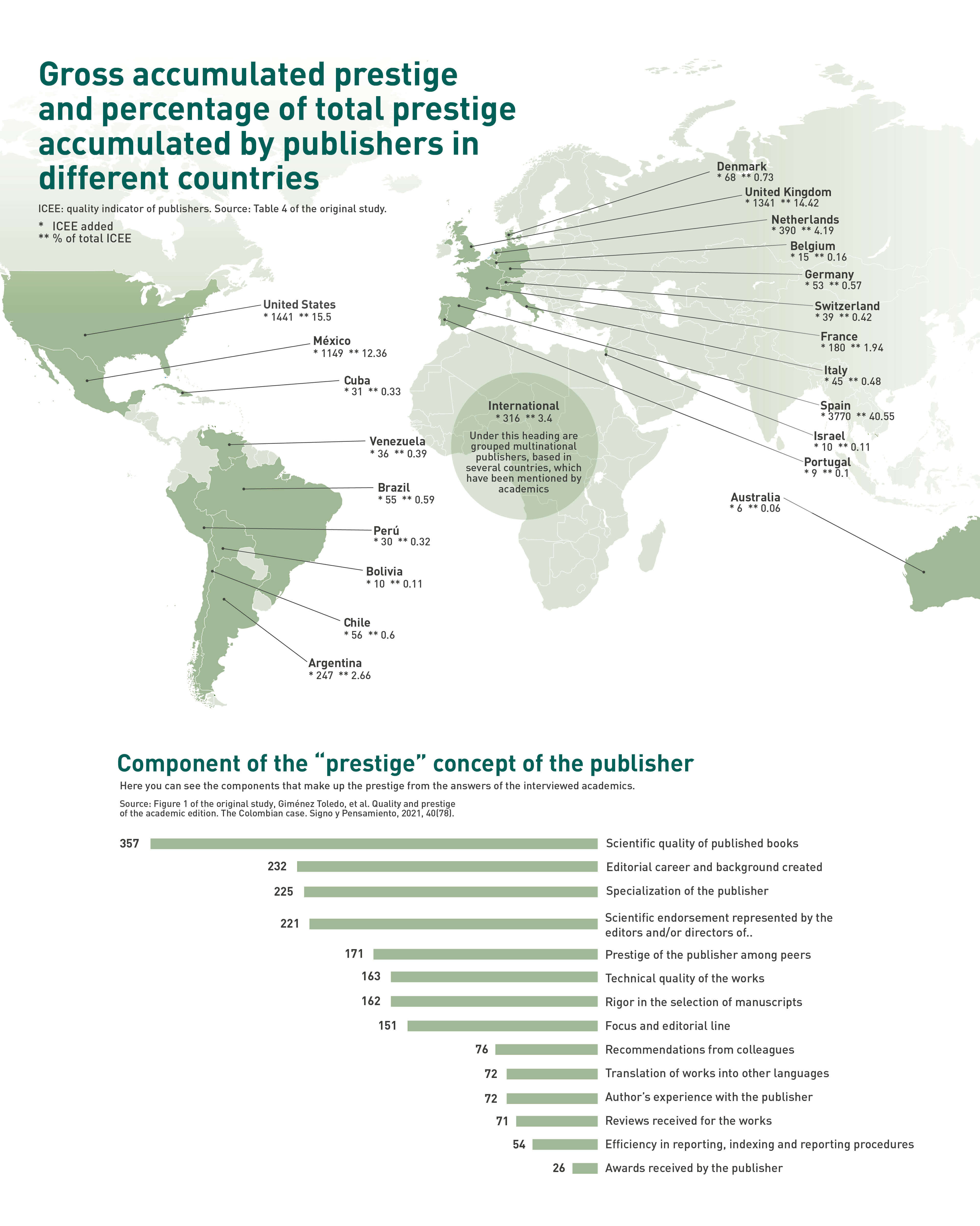How academics perceive publishers in Colombia
By: Felipe Abondano
Photos: URosario https://doi.org/10.12804/dvcn_10336.42751_num7
Society and Culture

By: Felipe Abondano
Photos: URosario https://doi.org/10.12804/dvcn_10336.42751_num7
Publishing and being read is difficult. It is even more so in the universe of scientific research, especially in the social sciences. Months or years of research that aims to shed light on the challenges facing the country, including the world, may end up archived in shelves and basements where others will never look. Which factors influence whether research is considered valuable, of good quality and relevant? How much of this corresponds to a perception of academic quality?
To understand this phenomenon in depth, researchers Juan Felipe Córdoba-Restrepo, director of the Editorial Universidad del Rosario; Elea Giménez Toledo and Jorge Mañana Rodríguez, of the Research Group on the Academic Book (Ilia) of the Consejo Superior de Investigaciones Científicas de España (CSIC); and Esteban Giraldo González, of Universidad Carlos III de Madrid, conducted a study entitled “Quality and prestige of the academic edition. The Colombian case,” published in the journal Signo y Pensamiento of Universidad Javeriana.
Draw the Colombian editorial map
The objective of this study was to define the landscape of the academic publishing sector in Colombia with an emphasis on identifying those publishers recognized by the academy. It was sought not only to determine which are the most prestigious national and international publishers in this context, but also to evaluate the relationship between prestige and quality in the exercise of disseminating knowledge.
To respond to their approaches, the study group made a detailed analysis of the typology and geographical origin of these outstanding academic publishers. Likewise, it carried out a comparative study with the results of surveys carried out in Spain, with the purpose of identifying some aspects related to the circulation and recognition of books in Spanish, in order to generate a broader and contextualized vision of the academic editorial panorama in the field of the spanish language.
The results of the study show that in the imagination of Colombian researchers there are only 167 national publishers specialized in the publication of their research or academic works, although in reality there are more than 300, and of these only a few are considered to have prestige and quality.
On the other hand, the analysis of the authors concludes that the predominant format in Colombia to disseminate the human and social sciences is the book, while databases and journals are the the main format for the basic and applied sciences. This, in their concept, limits the scope of dissemination of the humanities and social sciences, and may prevent the Colombian academy from multiplying its publications.
In addition, in Colombia, academic publications are limited to university work, while in the international landscape private or commercial publishers usually have an academic line that facilitates the dissemination of knowledge. Therefore, if prestige and quality go hand in hand and only universities publish, the number of recognized or trusted spaces to showcase research is reduced.

Juan Felipe Córdoba-Restrepo, director of Editorial Universidad del Rosario and researcher of the study "Quality and Prestige of Academic Publishing: The Colombian Case."
The methodological challenge
The study was based on a survey sent to 2 426 Colombian academics, which investigated the researcher's profile, his knowledge about Colombian academic collections and publishers, foreign academic publishers, and Colombian academic collections. Finally, they were asked about the characteristics that they considered identifying the prestige and quality of a publisher.
The researchers created lists of Colombian and foreign publishers, integrated them into the questionnaire, and were able to explore which of them were known to the academics. They also asked respondents to sort them according their own prestige rating.
Thus, they obtained 408 responses from the academics linked to the study, characterized by being professionals and teachers specialized in human and social sciences, with solid trajectories in different institutions of higher education in the country. These participants were identified and selected through the vice-rectories and research units of the 167 educational organizations categorized and certified as universities.
What Do We Understand by "Academic Quality"?
The exercise of this survey showed that research in the humanities and social sciences in Colombia is mainly focused on the publication of books in university publishers. In this sense, the prestige and quality of these organizations is associated with the prestige of the universities to which they belong and are allied. This is demonstrated by these figures of the follow-up: according to the respondents, the most prestigious publisher in social and human sciences at the national level is the EditorialUniversidad Nacional de Colombia, followed by Ediciones Uniandes and the Editorial Universidad de Antioquia . For foreign publishers, the Economic Culture Fund Económica (FCE) tops the list, followed by Oxford University Press and Elsevier.
The Universidad Industrial de Santander (UIS), the Universidad de La Salle and Ecoe ediciones close the list of the most recognized in the national context, according to the study. The last foreign publishers listed were Wiley, Taylor & Francis Group and Anthropos Editorial.
The authors highlight that in Colombia the most prestigious publishers are those affiliated with universities, while foreign publishers with this characteristic are, mostly, non-university publishers. This is because national commercial publishers often do not build strong academic lines and universities, therefore, found themselves in the need to develop their own publications in order to disseminate their research.
It should be noted that the survey made it possible to assess whether the responses were biased in having participated in the publications of these publishers. It is interesting to note that certain reputable publishers show lower ratings when the evaluation is limited to the perspective of researchers in general. Conversely, there are editorials that obtain a more favorable position when the opinion of those who have previously published on their platforms is taken into account. This finding highlights the importance of considering diverse perspectives and experiences when assessing the prestige and quality of publishers in the academic context.
The figures obtained allow us to identify from which countries the most recognized publications by Colombian academics come. The list is topped by Spain, the United States and the United Kingdom, and closed by Israel, Portugal and conglomerates of indistinct countries.
Likewise, to explore the concept of prestige, academics were asked to indicate which factors are more or less important to configure the prestige of a publisher. The most voted was “scientific quality of published books”, while the least voted was “awards received by the publisher.”

A Future Commitment
The study concludes that it is possible to propose a first approach to the Colombian editorial- academic landscape. Although the methodology and results allow to create a map of the publishers, the actors and the forms of publication most welcomed and active in the production of knowledge at national level, the work also opens the door to the recognition of forms of publication that sometimes remain outside the international rankings and do not receive the same attention as the publications of the indexed journals.
Researchers reflect on their medium to understand not only who publishes and where, but also how the same academic medium evaluates and rates channels of disclosure of scientific production.
In this way they conclude that in order to have recognition and visibility it is necessary to standardize the forms of evaluation of the publications and thus allowing for discussions of quality beyond prestige.
The study team states that “developing complete data sources on the edition of academic books in Spanish is a relevant task to make visible and recognized the scientific activity of researchers who write about their research results, as well as that of the editors who transform these texts into books.”
With this in mind, two things become evident: first, that the study not only aims to make visible an editorial and academic practice that transcends the international trend of publishing articles in databases (such as Web of Science by Clarivate Analytics, and Scopus by Elsevier) but also to utilize books as a means of knowledge dissemination. Second, the research highlights the importance of promoting high-quality publishing platforms to reduce the gap between Spanish and Latin American publishers, as well as between these and English publications. Likewise, this type of studies helps to combat the dispersion of information and allow us to understand the world of publishing in Colombia, especially in relation to the academic universe.
For example, the most prestigious publishers come from two distinct backgrounds: the Spanish language, with publishers coming mainly from Spain, Mexico and Argentina, and the Anglo-Saxon language, with American, English, Dutch and Belgian publishers, among others. The survey revealed that the quality of publications is the most valued variable by researchers and will undoubtedly be the key factor to put Colombia in a place on that list of those rated as prestigious.
In the opinion of the consensus of the study, only with the construction of information systems based on context and evidence can we favor the quality of the edition of knowledge in Spanish and other languages. Efforts like this one, which allows us to know what exists in the country and how it is valued, are a very important first step to create new national models of evaluation and production of knowledge. Another inspiring example is given by the Latin American Council of Social Sciences (CLACSO), which since 2019 has organized the Latin American Forum on Scientific Evaluation (FOLEC-CLACSO) and is already in its third version, always with the support, among others, of the National Council of Science and Technology (CONACYT) of Mexico and the National Council of Scientific and Technical Research (CONICET) of Argentina.
